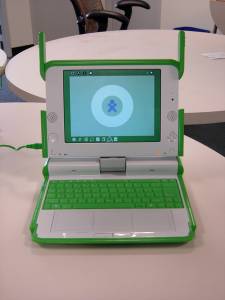OLPC Laptops Arrive (Updated)
 I've had my doubts in the past as to whether the One Laptop Per Child project (aka, "$100 Laptop") was taking the right course. After all, mobile phones have far greater penetration in the developing world, and a system that piggybacked on the mobile phone networks -- and used a device that could double as such a phone -- seemed a safer, and more likely to succeed, plan. Nonetheless, the OLPC group has done a good deal that's right with this project, and if it succeeds, it would certainly have a greater positive impact than would the fancy cell phone approach. The OLPC system is much more open than a phone would be, from the underlying Linux kernel/GNU OS (hi, Glyn!) to the use of WiFi mesh networking instead of a proprietary cellular network.
I've had my doubts in the past as to whether the One Laptop Per Child project (aka, "$100 Laptop") was taking the right course. After all, mobile phones have far greater penetration in the developing world, and a system that piggybacked on the mobile phone networks -- and used a device that could double as such a phone -- seemed a safer, and more likely to succeed, plan. Nonetheless, the OLPC group has done a good deal that's right with this project, and if it succeeds, it would certainly have a greater positive impact than would the fancy cell phone approach. The OLPC system is much more open than a phone would be, from the underlying Linux kernel/GNU OS (hi, Glyn!) to the use of WiFi mesh networking instead of a proprietary cellular network.
The OLPC headquarters received their first shipment of working computers today, and have posted a series of "unboxing" photos to the web. A few things stand out: these are cute machines, from the bright green highlights to the "rabbit ear" antennae; they have some features I'd love to have on my Macbook (the twisting screen and ebook mode, in particular); and these suckers are small -- that's a 12" notebook used as a size reference!
Congratulations to the OLPC team!
(Update: Greetings, WorldChanging readers! I see that Alex linked here in reference to the mobile phone alternative argument, so it might be useful for me to go into a bit more detail.
Information tools evolved from mobile phones have several key advantages over the OLPC model. These include: very low power requirements, easily met by cheap power generation and/or storage technologies; an existing infrastructure across much of the developing world, requiring very little in the way of new routing hardware; near-ubiquitous usage, reducing the likelihood of theft -- potentially a huge problem for the OLPC project; broad utility, so that the device can serve more than the education market (mobile phones are a major economic driver in the developing world); portability, for near-constant information and communication access.
There are disadvantages in comparison to the OLPC unit, of course. The most glaring is the usability of the interface: a typical mobile phone screen is just tiny, and even a PDA-sized phone (akin to a Palm device or Simputer) is less useful for reading and graphics than the OLPC laptop; and the lack of a real keyboard imposes significant limits on composition beyond short text-message length prose.
I do think it would be useful to offer phone/PDA type information tools as learning devices in the developing world, simply to allow a real comparison. I'm not sure it will happen through a dedicated, OLPC-type effort -- chances are, it will be an accidental result of the increasing dependence upon and power of mobile phones.)





